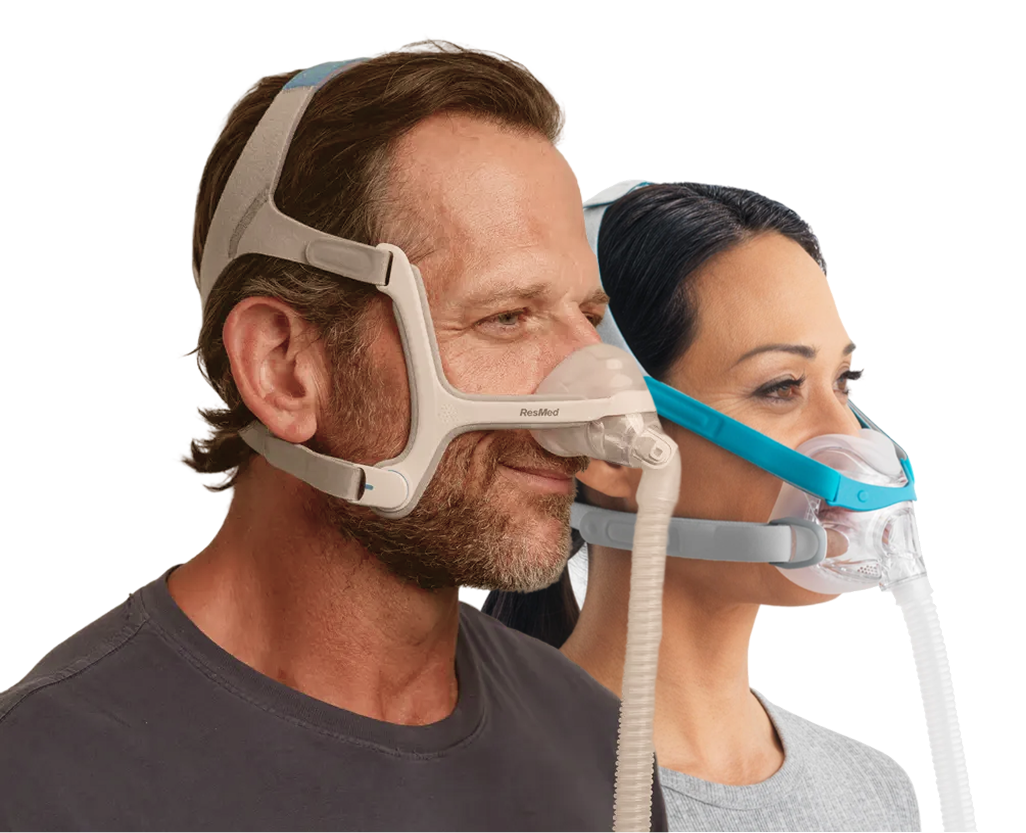Collection: Full Face Masks
We offer the latest full face masks from leading brands like ResMed, Philips Respironics, and Fisher & Paykel. Shop range of lightweight and non-intrusive full face masks online.
No products found
Use fewer filters or remove all
What is a CPAP full face mask?
A CPAP full face mask usually has a cushion that covers both the mouth and nose to create a seal over both airways. If you sleep and breathe with your mouth open or suffer from a blocked nose, a full face mask is recommended. These masks are also more suitable for higher pressure therapy as they are more comfortable to wear compared to other types of masks.
Which Is The Best Full Face CPAP Mask?
Although personal CPAP mask fitting is highly recommended. It is not always possible, convenient, or practical when choosing a mask for your CPAP machine.
We understand that finding the right CPAP mask size is important. Especially if you are new to CPAP therapy and don't know exactly which size is best full face CPAP mask for you.
For these reasons, we have expanded our wide range of CPAP masks. We've made it easier for you to identify mask options that include all available cushion or seal sizes
Look for this best rated full face CPAP mask to quickly identify which masks include multiple cushion sizes.
+ Philips DreamWear Gel Nasal Pillow
+ Philips Wisp Nasal with fabric frame
+ F&P Eson2 Nasal Mask
+ F&P Vitera Full Face
+ Philips DreamWear UtN Nasal
+ Resmed N30i Nasal Cradle Mask
+ Resmed P10 Nasal Pillow
+ F&P Brevida Nasal Pillow
Why Choose a CPAP Full Face Mask?
Full coverage of the airway
One of the biggest advantages of full face CPAP masks is their ability to cover the entire face, including the nose and mouth. The design of a full face mask is ideal for people who breathe through the mouth or suffer from nasal congestion. By sealing off all airways, full face masks can effectively treat sleep apnea regardless of how you breathe during sleep.
Minimizes air leaks
Full face masks are known for their excellent ability to minimize air leaks, a common problem with other types of CPAP masks. These masks provide a secure fit over the mouth and nose, reducing the risk of air leakage. This ensures a more effective and consistent airflow throughout the night. Reducing air leaks improves both the effectiveness of the therapy and the comfort of the patient.
Suitable for high pressure settings
Some people require higher air pressure settings to effectively treat their sleep apnea. Full face mask is particularly suitable for this as they cause less discomfort or side effects caused by air pressure. Common side effects caused by air pressure include dry eyes or nasal congestion, which can occur with nasal or nasal pillow masks. Thanks to the secure seal, the required pressure is maintained without discomfort.
CPAP Full face masks suitable for facial hair
Full face masks are often a better choice than nasal masks if you have facial hair or a beard. Facial hair can affect the seal of nasal masks, leading to air leaks and reduced therapy effectiveness. However, a full face mask works well with facial hair and ensure consistent therapy, even if the wearer prefers a beard or moustache.
Improved sleep quality
CPAP Full face masks offer numerous benefits, from improved comfort to supporting higher air pressure levels. These factors contribute to a better quality of sleep. A well-fitting full face mask ensures a consistent supply of oxygen throughout the night. By preventing breathing interruptions, you can sleep deeper and more restfully, which in turn reduces daytime sleepiness.
FAQs
Is it better to use a full face mask?
Full-face masks usually cover the area from the chin to the nose bridge, but they come in different sizes. They use a triangular cushion to deliver air to both the mouth and nose. Your sleep position matters too - side sleepers may prefer nasal masks, while back sleepers often find full-face masks more stable and comfortable.
Are CPAP full face masks safe?
Full face snorkeling masks are associated with a higher risk of shallow breathing due to the breathing mechanism used. Snorkelers using such masks may unconsciously limit their breaths to short, shallow inhalations and exhalations.
How to put on a full face CPAP mask?
+ Step 1: Undo the clips at the bottom of the straps that go over your full face mask.
+ Step 2: Lift the straps up.
+ Step 3: Put the soft plastic part of the mask over your mouth and nose, and then push it down so that it fits snugly.
+ Step 4: Pull the mask straps over your head.
+ Step 5: Put the clips on the bottom straps back on to your mask.
What is the difference between a full face mask and others?
Similar to a full face mask, a full face mask equalizes the pressure so that the air treatment is even. However, this mask covers the entire face and covers all areas where air could escape, such as the eyes.
How to clean a CPAP full face mask?
Most CPAP accessories, such as hoses, tubes and masks, can be cleaned with only mild soap and water. Follow the instructions from CPAP Discount Warehouse that made your CPAP machine.

